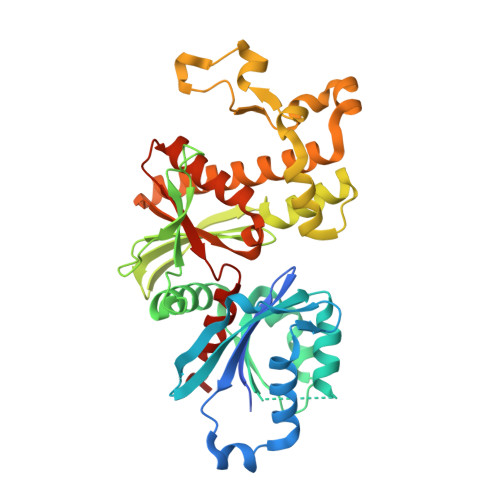Relief of CoA sequestration and restoration of mitochondrial function in a mouse model of propionic acidemia.
Subramanian, C., Frank, M.W., Tangallapally, R., Yun, M.K., White, S.W., Lee, R.E., Rock, C.O., Jackowski, S.(2023) J Inherit Metab Dis 46: 28-42
- PubMed: 36251252
- DOI: https://doi.org/10.1002/jimd.12570
- Primary Citation of Related Structures:
7UE8 - PubMed Abstract:
Propionic acidemia (PA, OMIM 606054) is a devastating inborn error of metabolism arising from mutations that reduce the activity of the mitochondrial enzyme propionyl-CoA carboxylase (PCC). The defects in PCC reduce the concentrations of nonesterified coenzyme A (CoASH), thus compromising mitochondrial function and disrupting intermediary metabolism. Here, we use a hypomorphic PA mouse model to test the effectiveness of BBP-671 in correcting the metabolic imbalances in PA. BBP-671 is a high-affinity allosteric pantothenate kinase activator that counteracts feedback inhibition of the enzyme to increase the intracellular concentration of CoA. Liver CoASH and acetyl-CoA are depressed in PA mice and BBP-671 treatment normalizes the cellular concentrations of these two key cofactors. Hepatic propionyl-CoA is also reduced by BBP-671 leading to an improved intracellular C3:C2-CoA ratio. Elevated plasma C3:C2-carnitine ratio and methylcitrate, hallmark biomarkers of PA, are significantly reduced by BBP-671. The large elevations of malate and α-ketoglutarate in the urine of PA mice are biomarkers for compromised tricarboxylic acid cycle activity and BBP-671 therapy reduces the amounts of both metabolites. Furthermore, the low survival of PA mice is restored to normal by BBP-671. These data show that BBP-671 relieves CoA sequestration, improves mitochondrial function, reduces plasma PA biomarkers, and extends the lifespan of PA mice, providing the preclinical foundation for the therapeutic potential of BBP-671.
Organizational Affiliation:
Department of Infectious Diseases, St. Jude Children's Research Hospital, Memphis, Tennessee, United States.





















